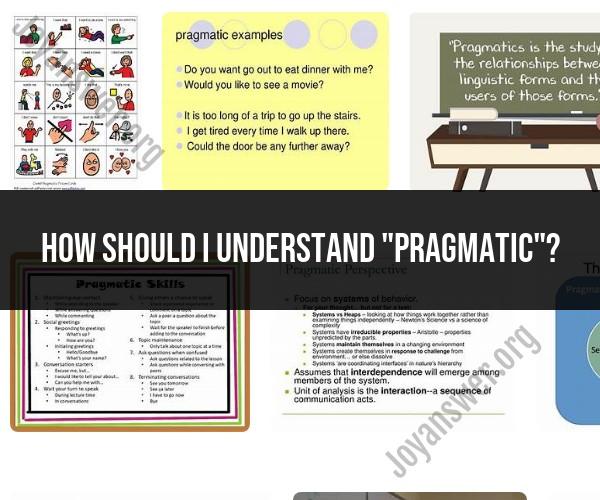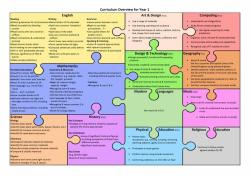How should I understand "pragmatic"?
"Pragmatic" is an adjective that is used to describe a practical, sensible, and realistic approach to solving problems or making decisions. It refers to a way of thinking and acting that focuses on achieving practical results rather than getting caught up in theoretical or idealistic considerations.
Here are key aspects of understanding "pragmatic":
Practicality: Being pragmatic means prioritizing practical considerations and solutions over theoretical or abstract ones. Pragmatic individuals often ask, "What works in the real world?" rather than "What should work in an ideal world?"
Realism: Pragmatism emphasizes dealing with situations and problems as they are, rather than as one wishes them to be. It acknowledges that ideal solutions may not always be achievable, and it seeks the best possible outcome given the circumstances.
Problem-Solving: Pragmatic people are often good problem solvers. They assess the available options, weigh the pros and cons, and choose the course of action that is most likely to lead to a practical and effective solution.
Flexibility: Pragmatism is adaptable and willing to change course if necessary. It does not rigidly adhere to a specific ideology or set of principles but rather adjusts strategies based on the situation.
Empirical Approach: Pragmatism values evidence and practical experience. It relies on data and feedback to inform decisions and actions.
Results-Oriented: Pragmatic individuals focus on achieving results and measurable outcomes. They are less concerned with adhering to a particular doctrine or ideology if it does not lead to practical benefits.
Usage of "pragmatic" in a sentence:
- "She took a pragmatic approach to budgeting, allocating resources based on the most pressing needs of the organization."
- "In politics, a pragmatic leader may compromise with the opposition to pass legislation that benefits the majority of citizens."
- "His pragmatic advice was to fix the immediate problem first and then work on long-term solutions."
- "Pragmatic decisions in business often involve prioritizing cost-effectiveness and efficiency."
In summary, "pragmatic" describes a practical and results-oriented approach to problem-solving and decision-making. It values real-world effectiveness over theoretical ideals and is often associated with adaptability and a focus on achieving tangible outcomes.
1. Deciphering "Pragmatic": Unpacking the Meaning and Implications
The word "pragmatic" can be a bit slippery to define, as it has multiple meanings and nuances. However, at its core, pragmatism is about being practical and realistic. It is about making decisions and taking actions that are based on what is feasible and effective, rather than on abstract ideals or theories.
Pragmatism is often contrasted with idealism, which is the belief that we should strive for the perfect, even if it is unattainable. Pragmatists, on the other hand, are more willing to compromise and accept the imperfect in order to achieve real-world progress.
Pragmatism has a number of implications for our lives and work. For example, a pragmatic person might be more likely to choose a career that is likely to be financially rewarding, even if it is not their dream job. Or, a pragmatic person might be more likely to settle for a good compromise in a negotiation, rather than holding out for the perfect outcome.
2. Understanding Pragmatism: What Does "Pragmatic" Really Mean?
The term "pragmatic" comes from the Greek word "pragma," which means "deed" or "action." Pragmatism is a philosophical movement that emerged in the late 19th century, and it is often associated with American thinkers such as Charles Sanders Peirce, William James, and John Dewey.
Pragmatists believe that the truth of a belief is determined by its practical consequences. In other words, a belief is true if it leads to useful and beneficial outcomes. Pragmatists also believe that knowledge is constantly evolving, and that we should be open to new ideas and perspectives.
3. Practicality in Perspective: Making Sense of the Term "Pragmatic"
In everyday language, the word "pragmatic" is often used to describe someone who is sensible and practical. For example, we might say that a pragmatic person is more likely to focus on solving problems than on complaining about them. Or, we might say that a pragmatic person is more likely to choose a career path that is in demand than to chase a pipe dream.
Pragmatism is an important quality to have in life and work. It allows us to make sound decisions and to achieve our goals. However, it is important to note that pragmatism is not the same as cynicism. Pragmatists are realistic about the challenges they face, but they are also optimistic about the possibility of making progress.
Here are some examples of pragmatism in action:
- A business owner who decides to close a struggling location instead of investing more money into it.
- A doctor who recommends a less invasive procedure to a patient, even though it is not as effective as a more invasive procedure.
- A politician who compromises with their opponents in order to pass a bill.
- A parent who allows their child to watch TV for an hour a day, even though they prefer that their child not watch TV at all.
In all of these cases, the pragmatic person is making a decision that they believe is the best possible decision under the circumstances. They are not letting their personal beliefs or ideals stand in the way of making a practical choice.













